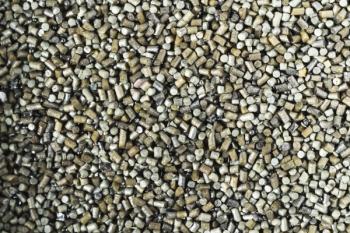
- LCGC North America-05-01-2015
- Volume 33
- Issue 5
New Gas Chromatography Products, 2014–2015
In this installment, John Hinshaw reviews gas chromatography (GC) instruments, columns, and accessories that were newly on display at the Pittsburgh Conference in New Orleans, Louisiana, during March 2015, or were introduced to the marketplace in the preceding year.
In this installment, John Hinshaw reviews gas chromatography (GC) instruments, columns, and accessories that were newly on display at the Pittsburgh Conference in New Orleans, Louisiana, during March 2015, or were introduced to the marketplace in the preceding year.
From March 8–12, 2015, the Pittsburgh Conference on Analytical Chemistry and Applied Spectroscopy (Pittcon) returned to the Morial Convention Center in New Orleans, Louisiana, for its 66th annual meeting. This was the first time since 2008 that the conference had taken place in New Orleans, and the city welcomed the 14,272 registered attendees with open arms, brass bands, and beignets. There were 919 exhibitors in 1690 booths, and this year 90 countries were represented. Although I did not attend many of the technical sessions, they were of as high quality and as well attended as in previous years. Of particular interest to the readers of LCGC was the half-day session devoted to the presentation of the 2015 LCGC Lifetime Achievement in Chromatography Award to Jack Kirkland (Advanced Materials Technology) and the LCGC Emerging Leader in Chromatography Award to Caroline West (Université d'Orléans, France). Please see the February 2015 issue of LCGCNorth America (1) for more information about this year's awards.
Pittcon will head to Atlanta in 2016, where conferees will enjoy a second consecutive year of Southern hospitality. In 2017, the conference returns to Chicago.
This annual installment reviews gas chromatography (GC) instrumentation, columns, and accessories shown at this year's Pittcon or introduced during the previous year. For a review of new products in other areas of chromatography, columns, and related accessories, please see the additional coverage in the April issue as well as this issue of LCGC North America (2–4), which are also available on-line at LCGC's website.
The information presented here is based on manufacturers' replies to questionnaires, as well as additional information from manufacturers' press releases, websites, and product literature about the past year's products, and not on actual use or experience of the author. During Pittcon, I took time to stroll around the convention aisles and see some of the new products firsthand as well as discover a number of items that weren't covered by the questionnaires. Every effort has been made to collect accurate information, but because of the preliminary nature of some of the material, LCGC North America cannot be responsible for errors or omissions. This column installment cannot be considered to be a complete record of all new GC products introduced this year at Pittcon or elsewhere because not all manufacturers chose to respond to the questionnaire or attend the conference, nor is all of the submitted information necessarily included here because of the limited available space and the editors' judgment about its suitability.
Gas Chromatography in 2014–2015
Gas chromatography again displayed renewed vigor in the past year, which certainly was evident at the 2015 Pittcon conference. Comprehensive GC×GC continues to yield significant advances, in particular when combined with mass spectrometry (MS) detection. MS detectors for GC alone experienced no fewer than six new or enhanced product introductions. Advances in fast mini- and micro-sized GC systems were evident, too, as well as a nice assortment of valves, fittings, syringes, gas accessories, and columns.
In the instrument system area, Agilent Technologies introduced the 7200B quadrupole time-of-flight (QTOF) GC–MS system plus the 7010 Triple-Quad GC–MS system with an improved electron ionization (EI) source. Both of these offerings work with the company's gas chromatographs. Also in the GC–MS area, the AccuTOF-GCx TOF GC–MS system from JEOL works with comprehensive two dimensional (2D) GC to make a powerful GC×GC–MS analyzer. LECO displayed its newest GC×GC–MS system, the Pegasus GC-HRT 4D. Also coming in with a new product in this area, Shimadzu introduced the GCMS-TQ8040 triple-quadrupole GC–MS system. Finally, Thermo Scientific had its TSQ Duo triple-quadrupole GC–MS-MS system on-hand. Please see Table II for the details and specifications supplied by the manufacturers for these high-end hyphenated GC instruments.
The AQMAlert Ozone Precursor system from Baseline Mocon combines two of the company's model 9100 GC systems and a preconcentrator into a photochemical assessment monitoring station. From Gow-Mac, the Series 8100 programmable GC system represents a new customizable application-specific laboratory system with multiple inlets, detectors, and other options. In miniature and micro GC systems, Defiant Technologies showed the TOCAM toxic organic chemical monitor, based on a microconcentrator and micro-GC column for rapid screening and more detailed analyses. A new entry to micro-GC, Qmicro brought examples of its GC cartridge with integrated sampling valve, detector, and backflushing options, to be made available to original equipment manufacturers (OEMs).
Table III lists new GC accessories such as autosamplers, detectors, and more. From DANI, the Peakblade 77 GC×GC modulator is a liquid-nitrogen-free device with rapid and programmable thermal modulation. Two fast GC accessories were shown at Pittcon: the fast GC conversion kit from VICI that integrates the company's resistively heated columns and controller with Agilent GC systems, and a fast GC add-on for Ionicon's PTR-TOF gas analyzer. Analytical Flow Products (AFP) introduced a modular multipurpose valve oven, a miniature version of the company's multiport valve, and a new design for zero-dead-volume fittings. Shimadzu introduced two accessory products: the AOC-6000 autosampler, which automates calibration sample preparation, and the ECD-2010 Exceed electron-capture detector. SGE introduced a new version of its Diamond headspace syringe line. The EZGC Software Suite Online from Restek has been expanded with some additional calculation and translation capabilities.
Only two companies submitted information about new GC columns, as shown in Table IV. Restek has two new columns, the Rt-Silica BOND porous-layer open-tubular (PLOT) column for permanent gas separations and the Rxi-1301Sil MS column, which targets solvent analyses with MS detection. Phenomenex introduced a two-column set that consists of the company's ZB-CLPesticides-1 and ZB-CLPesticides-2 columns and is targeted for multiple polychlorinated biphenyl (PCB) US Environmental Protection Agency (EPA) methods that use electron-capture detection.
Acknowledgments
I would like to thank the manufacturers and distributors that kindly furnished the requested information, which allowed a timely report on new product introductions over the past year. For those manufacturers who did not receive a "New Products" questionnaire this year and would like to receive one and be considered for early inclusion into the 2015–2016 new GC and related product introductions review, please send the name of the primary company contact, the mailing address, fax number, and e-mail address to Laura Bush, Editorial Director, LCGCNorth America,
References
(1) M. L'Heureux, LCGC North Am.33(2), 108–121 (2015).
(2) M. Swartz, LCGC North Am.33(4), 232–247 (2015).
(3) M.W. Dong, LCGC North Am.33(4), 232–247 (2015).
(4) D.E. Raynie, LCGC North Am.33(5), 306–310 (2015).
John V. Hinshaw "GC Connections" editor John V. Hinshaw is a Senior Scientist at Serveron Corporation in Beaverton, Oregon, and a member of LCGC's editorial advisory board. Direct correspondence about this column to the author via e-mail:
John V. Hinshaw
Articles in this issue
over 10 years ago
Calibration Problems — A Case Studyover 10 years ago
Georges Guiochon: Separation Science Innovatorover 10 years ago
New Sample Preparation Products and Accessories at Pittcon 2015over 10 years ago
Choosing the Correct Sample Preparation Techniqueover 10 years ago
Joseph Jack Kirkland: LCGC’s 2015 Lifetime Achievement Award Winnerover 10 years ago
LC/GC Checkerover 10 years ago
Vol 33 No 5 LCGC North America May 2015 Regular Issue PDFNewsletter
Join the global community of analytical scientists who trust LCGC for insights on the latest techniques, trends, and expert solutions in chromatography.





